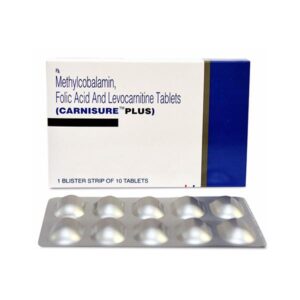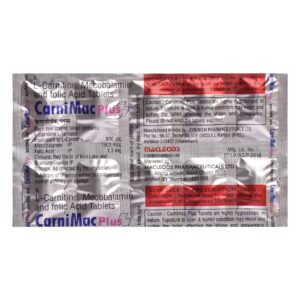ANTIOXIDANTS + LEVOCARNITINE AND FOLIC ACID + METHYLCOBLAMIN
Antioxidants: Antioxidants are a class of compounds that can help protect cells against the damaging effects of free radicals, which are unstable molecules that can cause oxidative stress and contribute to various diseases. This group of compounds includes vitamins (such as vitamins C and E), minerals (such as selenium and manganese), and plant-based compounds (such as flavonoids and carotenoids).
The primary use of antioxidants is to counteract oxidative stress and reduce the risk of chronic diseases, including heart disease, cancer, and neurodegenerative disorders. They are also thought to have anti-aging effects and support overall health and well-being.
The mechanism of action of antioxidants revolves around their ability to neutralize free radicals. Free radicals are highly reactive molecules that can damage cells and DNA. Antioxidants donate electrons to these free radicals, effectively stabilizing them and preventing them from causing further harm.
The recommended dose of antioxidants varies depending on the specific compound and the individual’s needs. Most antioxidants can be obtained through a healthy diet rich in fruits, vegetables, whole grains, and legumes. However, in some cases, dietary supplements may be recommended to ensure adequate intake.
While antioxidants are generally considered safe when consumed through food sources, excessive use of antioxidant supplements may have adverse effects. Some studies have suggested that high doses of certain antioxidants, such as beta-carotene and vitamin E supplements, may increase the risk of certain diseases, including lung cancer and cardiovascular disease. Therefore, it is important to consult with a healthcare professional before starting any antioxidant supplementation.
In summary, antioxidants are compounds that play a crucial role in protecting cells against the damaging effects of free radicals. They are commonly used to reduce the risk of chronic diseases and promote overall health. However, it is important to achieve a balance and not to exceed recommended doses to avoid potential side effects. Consulting with a healthcare professional is recommended before beginning any antioxidant supplementation regimen.
Levocarnitine And Folic Acid: Levocarnitine and Folic Acid is a combination medication that is mainly used to treat certain types of anemia and to improve the nutritional status of patients. It contains two active ingredients: levocarnitine and folic acid.
Levocarnitine, also known as L-carnitine, is a natural substance that helps the body convert fat into energy. It is primarily used to treat levocarnitine deficiency, a condition that occurs when the body does not produce enough of this substance. Levocarnitine supplementation can help restore normal levels and improve energy production.
Folic acid, also called vitamin B9, is an essential nutrient that the body needs for proper cell growth and function. It is particularly important during pregnancy, as it helps prevent certain types of birth defects. Folic acid is also used to treat anemia caused by folic acid deficiency and to improve the effectiveness of certain medications used to treat depression.
The dose of Levocarnitine and Folic Acid can vary depending on the specific condition being treated and the patient’s age and weight. It is important to follow the instructions provided by a healthcare professional or the medication’s packaging. Generally, it is taken orally with or without food.
Like any medication, Levocarnitine and Folic Acid can cause side effects. Common side effects may include nausea, vomiting, stomach cramps, diarrhea, and a fishy odor to the urine, breath, or sweat due to the levocarnitine component. Allergic reactions are rare but possible and may manifest as rash, itching, swelling, dizziness, or difficulty breathing. If any of these side effects occur, it is important to seek medical attention.
It is essential to note that Levocarnitine and Folic Acid should only be taken under the guidance of a healthcare professional, as they need to determine the appropriate dosage and duration of treatment based on individual needs and medical history. It is also important to inform your doctor about any other medications or supplements being taken to avoid any potential interactions.
Methylcoblamin: Methylcobalamin is a form of vitamin B12 that is used as a dietary supplement and medication. It is commonly used to treat vitamin B12 deficiency, which can arise due to factors such as malabsorption, certain medications, or poor dietary intake.
The mechanism of action of methylcobalamin involves its conversion to coenzymes such as methylcobalamin and adenosylcobalamin, which are important for various cellular processes. Vitamin B12 is essential for the formation of red blood cells, DNA synthesis, and proper functioning of the nervous system.
The dose of methylcobalamin varies depending on the severity of vitamin B12 deficiency and the individual’s age. In general, a typical oral dose for adults is 1,000 to 2,000 micrograms (mcg) daily, either as a single dose or divided into multiple doses. For intramuscular or subcutaneous injections, lower doses of 500 mcg are usually administered once weekly or monthly.
Common side effects of methylcobalamin are generally mild and include diarrhea, itching, transient skin rash, headache, and dizziness. Some individuals may experience an allergic reaction to the drug, which can manifest as swelling, difficulty breathing, or hives. If these symptoms occur, medical attention should be sought immediately.
It is important to note that methylcobalamin should be used under the guidance of a healthcare professional. While it is generally considered safe, it may interact with certain medications or medical conditions. Therefore, it is recommended to consult a healthcare provider before starting or changing the dose of methylcobalamin.


